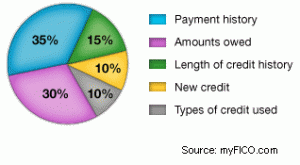
There obviously is some confusion that a credit score and a credit report are the same. I have seen some top credit experts and media outlets claim they are synonymous. Well, they are wrong. They are two very different items being reported on your personal credit file.
Your credit score is assessed by the FICOs scoring model used by Experian, TransUnion and Equifax. The three national credit bureaus then sell those scores to Lenders and others. The three credit bureaus have a license agreement to use the FICO score model and thus report those scores on their own credit file.
The credit score that you receive from Equifax, TransUnion and Experian is assessed based on the information being reported to each bureau independently by creditors. This is why the bureaus have different information on your credit file. Some creditors may not report to all three credit bureaus.
Remember these credit reporting agencies are independent of each other and don’t share your information with each other unless it is a fraud alert.
The graph below shows how Fair Isaac determines yours credit score with their FICO algorithm that the bureaus currently resale to creditors.

A credit report is information that is gathered by Experian, TransUnion, and Equifax. The three credit bureaus gather information that is reported to them by companies that have extended credit to you.
Your personal information such as your social security number, current and past residential address, birth date, and previous employers will be in this file.
Credit history will also be reported. Credit history is the majority of this record which includes accounts opened with creditors, payment history, authorized users, credit limit, revolving credit history, open dates, closed or inactive accounts, and payment terms.
Credit inquires are also reported on your credit report. A credit reporting agencies will show an inquiry when your report is showed to a 3rd party such as banks, credit card companies, landlords, and insurance companies.
A public record is part of this report as well. This record is obtained from government sources such as courts, which include bankruptcies, child support, and judgments.
You can easily see how a credit score and a credit report are different. Both do however work in conjunction with each other to determine your creditworthiness.
Now it is possible to have a credit file with no credit score. However you cannot have a credit score with no credit file. A credit history must be present to determine a score. Typically this history must be at least 3 to 6 months before FICO will calculate a credit score.
Author: Mike Clover
CreditScoreQuick.com



